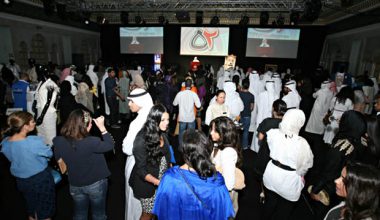From underneath the warmth of his blanket, Abdulrahman Al-Terkait, eyes half open, stretched out his arm to tap "snooze" on his smart phone screen to silence the incessant nagging of the alarm clock app. It was 4:07 a.m., which meant he was already seven minutes behind schedule.
By 4:30 a.m., Al-Terkait was in his car, driving on an empty street with the windows down in the hope that the chill of the brisk December air would awaken his senses. His usual cup of coffee (double cream, no sugar) awaited him in his newly opened breakfast diner, The Breakfast Club. By 4:45 am, he was at the doorstep of the restaurant. As soon as he opened the door, the clucking of the kitchen clutter crashed the short lived silence he had enjoyed so far.
For the next nine and a half hours, Al-Terkait would have time to sit down for a total of fifteen precious minutes (on a light day) before the final order came in at 2:30 p.m. A quick pop into the kitchen to help with the cleanup was the final task of the day, and by 5 p.m. or so, Al-Terkait was driving back home. A snack preceded the daily phone conference with his partners, which was seldom kept brief. Before it was even seven in the evening, Al-Terkait was already lying in bed, his alarm clock set to 4:00 a.m.
Such is the typical day in the life of a startup founder: hectic, overwhelming, and uncompromising.
It appears that the sixteen hour work day has become the paraded mantra of successful entrepreneurs. Work hard, work smart, and work some more. An entrepreneur must not let superfluous luxuries such as relationships, hobbies, or even sleep obstruct the unremitting march towards success. In the startup ethos, a balance between life and work is a myth: unattainable, nonexistent.
It is a philosophy driven by pressure. The startup world, especially in technology, moves at a relentless pace. Everyone wants to be the first to market, fastest growing, highest selling, most downloaded, most engaging, and so on. It is competition at its most ruthless; blink, and you might find yourself behind the pack and obsolete.The pressure never ceases to accumulate, and it pushes founders to sacrifice every aspect of their lives in the quest for success and validation.
But that philosophy is fundamentally flawed. The most common and yet most unaddressed reasons star tups fail is founder burnout. Founding a business is a marathon, and working eighty hour weeks is ideal for a sprint, but detrimental in the long run. A quick glance at star tupanonymous.com (a support community that allows founders to post and ask question anonymously) is sufficient to grasp how common the “burnout and crash” problem truly is in the global startup scene.
In the Khaleeji world, however, there is a natural remedy for this problem. Khaleeji culture places high value on participating in social events, sustaining close relationships with family and friends, and being part of the community. It is a culture unbefitting to host the 80 hour work week philosophy championed by Silicon Valley et al. But it is that aspect that makes the Gulf a healthier setting for both businesses and their founders.
This has proven to be the case for The Breakfast Club’s founders; the Al-Terkait brothers and Bader Al-Omar, who exemplify an almost perfectly struck balance between life and work. I caught up with Abdulrahman Al-Terakit at The Breakfast Club’s downtown branch a month after his wedding to find out how he and his partners have been able to arrive at work- life equilibrium while continuously growing their venture.
“Three years ago (December, 2011), we, the founders, were working fifteen hour days, from 4 in the morning to 7 at night. It was exhausting. We started going on long stretches without seeing family or friends, and our social lives were quickly diminishing,” began Al-Terkait. “We therefore set and executed a plan around hiring and delegating to create a structure that allowed us to retain control without compromising quality. Building that structure effectively is what has allowed us to balance work and life.”
According to Al-Terkait, the cornerstone of an operative delegation structure is a strong and “synergetic” partnership. In the early days of a startup, founders (often without a partner) might be tempted to bite off more than they can chew in order to retain as much equity (defined as stake or share of the company) as possible. It is a common founder cognitive bias to overestimate the amount of work that can be accomplished during a single day, which is often the catalyst that gradually pushes the work-life scale in the “work” direction. Hence, the burnout cycle is initiated, and such founder will often end up owning a very large stake in a startup that has crashed towards a value of zero; in other words: a large ownership of nothing.
To avoid such seemingly inevitable fate, an entrepreneur is best advised to seek, at a very early stage, partners that offer valuable complementary skills and expertise.Beyond the business benefits of having a diverse and multitalented team, a well-delegated partnership allows each founder to avoid the pitfalls of over-working. And upon that partnership foundation, founders can build a structure that allows them to delegate more duties as the company expands. Hence, the burnout cycle is avoided, and the founders might end up owning a significant stake in a startup that is growing towards a substantial value. (For advice on choosing the right partners, I strongly recommend reading Noam Wasserman’s The Founder’s Dilemma)
Back at my meeting at The Breakfast Club with Al-Terkait, I asked him what he thought of the sacrifice-all, work-around-the-clock entrepreneurial approach.
“Forget the unavoidable burnout, and let’s assume that there exists an entrepreneur who can work 18 hour days without ever tiring. Even in that case, I still maintain that failing to have a social life is detrimental to a business, especially in the Gulf.” He pushed his half full cup of cappuccino to the side and leaned in before continuing, “Khaleeji culture is all about tightly knit communities, where everyone knows everyone. That in itself is a fantastic marketing tool for any business. As such, a healthy and active social life can immensely help a founder publicize their business, and I doubt that there is a place in the world where that is truer than the GCC. But if a founder works 24/7 on a business, they’ll end up killing their social lives and ultimately sacrificing a powerful publicity tool.”
That opinion, however, is not entirely shared by Kuwait based technology entrepreneur Mohammed Faris, who believes that attending to the Khaleeji social lifestyle is incompatible with the level of dedication required to start a thriving technology venture.
Faris, who is currently the lead programmer at mobile payment startup Next Payments, comments, “At some point, for an entrepreneur, the strain and time commitments of having a social life (to the Khaleeji standard) start to outweigh any tangible business benefits. I fully agree that there needs to be ample time allocated to close friends and family, and perhaps some recreation. But beyond that, real sacrifices must be made.”
“In technology startups, you are live 24 hours a day. It’s different; there is no time when you are truly “off ”. Regardless of how much work is delegated, startups in certain fields require a relatively higher level of dedication,” continued Faris, “The problem here [in the Arabian Gulf] is that people want to start a tech startup while still going to Dewaniyas five nights a week.That lack of dedication is the main reasons technology startups fail here; not founder burnout.”
It is valid that Khaleeji culture does create a social environment that can act as tempting (and rational) distraction for entrepreneurs. On the other hand, through societal and familial pressure, our culture works hard to prevent entrepreneurs from dedicating every minute of their waking lives to their businesses, no matter how strongly those entrepreneurs believe it will help them. In reward, our culture has set itself perfectly to allow business owners to enjoy a healthy work-life balance that is ultimately beneficial to the owners personally and to the business itself.
It is an advantage of building a business in the Gulf that is often mistook for a hindrance.
– Hashim Bahbahani
Bahbahani is the Managing Partner at Mirzam Gulf, a leveraged investments and private equity fund in Kuwait. Bahbahani's main interests are in technology startups and venture capital. He is also a regular contributor for StartupQ8.com, an online community for startups in Kuwait.
Illustration by Anjana Jain
—
This article was first published in The Well-Being Issue and can be purchased online here






